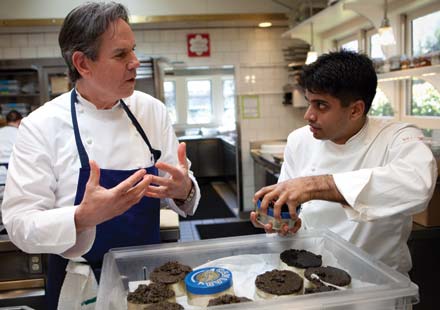All the world's a stage
They might soak up your spare time for no financial return, but a stage remains a classic way for a young chef to find his direction in the industry. Tom Vaughan finds out how to land a stage and how to behave on one
When 2003 Roux Scholar Simon Hulstone (pictured) finished a three-month stage at San Sebastian's Martín Berasategui restaurant, he regarded it as time largely wasted. Competing against 47 other chefs to help serve 40 covers from a three-Michelin-starred kitchen, which spoke in a completely alien language, the experience wasn't what he'd hoped for. "They didn't really know why I was there," recalls Hulstone. "It was a bit of an arrogant kitchen to be honest."
With the benefit of hindsight he's gone on to regard it as a vitally formative period in his career. "It was only when I came back that I realised how much I'd learned, especially in terms of cooking and the direction I wanted to go in food. I saw the difference between French and Spanish food and it helped lead me."
Short, sharp and unpaid, the stage remains a classic way for chefs to develop their career and cooking style. It is also a classic way to work yourself to the bone for free, sometimes in a position below a commis chef, while struggling to see the bigger picture. But that, says Laurie Gear, chef-patron of Artichoke restaurant in Buckinghamshire, is half its charm. "It's like a holiday - it's always in retrospect that you really grow to appreciate a stage," he says. "Of course, in every other way, it's the complete opposite of a holiday."
Starting from scratch, how does one go about securing a first stage? The first task is to choose the restaurant. Hulstone suggests heading for a smaller kitchen. "That was always my plan," he explains. "I thought it'd give me more opportunity to do stuff rather than being in a big kitchen, stood in the corner picking spinach."
Steve Smith, executive chef of the Michelin-starred Devonshire Arms hotel in Yorkshire, says his tactic as a young chef was to head for places that he admired. "I looked at restaurants that perhaps I wanted to eat in, but couldn't afford to, or that I wanted to work in and could maybe get a foot in the door."
As a career progresses, then a chef should experience more and more cuisines, says Gear. "It's crucial that youngsters don't become like clockwork mice and think food has to be classical, or has to be fusion. You should go out and try all these styles before becoming a head chef in your own right."
Talk to your head chef, suggests Desai, and see if he or she can pull in any contacts or has any suggestions of where to head. A good chef will be supportive of his staff's education, even if there's an outside chance of losing them, says Smith. "You'd be very sad if you tried to hold them back. If they want to improve and learn, and they have been good employees of yours, you have to help them." With a restaurant or restaurants chosen, it is then simply the task of writing a nicely worded letter to the head chef.
Finding the time and money to go about a stage is another matter. Jason Atherton, chef-patron of London's Pollen Street Social, was a serial stagiaire as an ambitious young chef, even wrangling himself a season in the kitchen at El Bulli. He fitted in stages between jobs, in spare time and at opportune moments.
"I went to work at Auberge de L'Ile [in Lyon] and stopped off for lunch in Strasbourg at Au Crocodile," he remembers. "I had such an amazing meal that I did a few days stage before starting my new job." Hulstone, when at Martín Berasategui, would use his days off to work stages at other famous restaurants nearby, doing short stints at Arzak and Mugartiz, both in San Sebastian, when his restaurant was closed.
Funding these trips can be a hurdle, but an ambitious chef will put something aside for his own education, explains Trevor Blythe, chef-patron of the White Fox restaurant in Tokyo, who did an unpaid year at Michel Guérard's three-Michelin-starred Les Prés d'Eugénie in south-west France. "I saw it as like going to university," he says. "I saved up for it for the year before I went and saw it as something that would help my career go further in the long term."
While Blythe's year-long stage is a rare luxury, the time a chef should spend as a stagiaire depends on various factors, says Atherton. "It's hard to put a time cap on it," he says. "It all depends on how much time you have available, how long you can afford to go for and whether there is a minimum time period - at El Bulli the minimum was a season."
Being a stagiaire can be daunting at the best of times, but it takes on an added difficulty when you don't speak the same language as the rest of the kitchen. But it is by no means an insurmountable obstacle - food is a great leveler, and a positive attitude is a international language. "It can be hard at first, especially when the head chef asks you to get a mixing bowl and you fetch a ladle," says Desai. "But if you show you are willing to work with them they will support you."
A successful stagiaire arrives with the right attitude. "I give my guys four tips - keep your mouth shut, be the first in the kitchen and the last to leave, work extremely hard and do as you're told," Atherton explains. "When you're there, have a pair of bollocks and clean down with the kitchen porters at the end of the service. You're a guest in their kitchen not an employee. I used to stay behind and clean down and I got a lot of respect for that."
Desai recommends taking a pen and a notepad but not to write things down aimlessly. "Write down a recipe so you don't have to ask twice, but only write it down once you have done it, so that you understand it, and only when there is spare time."
Finally, it is never too late for a chef to learn something. When the Artichoke was forced to close for 18 months due to fire, Gear managed to secure a stage at Noma in Copenhagen. "There were no chefs' secrets, they were totally open about their practices and had me hands-on with everything," he says. "There's no time limit to when you stop learning, whether you're eating somewhere or on a stage, I'd recommend it to anyone."
top tips how to secure and behave on a stage
â- If you are just starting out, aim for somewhere that will teach you the basics well
â- If you are serious about going on stages, put money aside from your earnings to fund them
â- Fit them in between jobs or in your spare time. Spend as long on them as you can afford, but don't disregard short stages
â- Don't be daunted by a language barrier - food is a great leveler and the right attitude is an international language
â- Work hard and look enthusiastic - you get out of a stage what you put into it
â- Win the kitchen's respect - be the first in, the last to leave and clean down with the kitchen porters
â- Take notes, but at the kitchen's convenience not your own
â- Ask questions if you need to, but don't ask the same question twice
â- Persevere, even if you are not enjoying it - the hardest stints are often the most rewarding
front-of-house stages
However, it is no excuse not to try and arrange a working visit to another restaurant, he adds. As a youngster, he'd arrange sommelier stages at high-end restaurants. And from Hotel du Vin, Sayburn sends his employees to work day-shifts at London restaurants.
Even just a few days at a high-profile property can teach a manager or waiter something. When Peter Avis, restaurant manager at Babylon restaurant at the Roof Gardens, London, won the Restaurant Manager of the Year Award, he spent five days at Danny Meyer's New York restaurant Eleven Madison Park. "It gives you the chance to pick up tips and see how they do things," he says. "For example, at Danny Meyer's some elements were unique. They'd get normal staff members to do briefings. I've brought elements of that back to my restaurant."
Hrishikesh Desai, head chef of the Brasserie at Lucknam Park, even suggests that chefs do a stint front of house. He did a sommelier stage at Olivier Roellinger's restaurant Les Maisons de Bricourt in Cancale, France, at the tail-end of his kitchen stage. "As a chef you should know everything - what cheese is being served, what wine and how the customers enjoy the food. I learnt much more about the philosophy of food, about presentation and produce. It was very important in my career."







